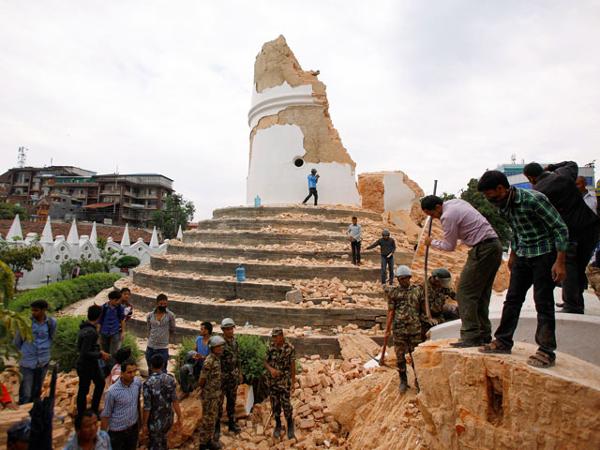Religious, archaeological and cultural sites would be reconstructed in five years
Nepal will reconstruct all private and public properties destroyed by the devastating earthquake within two years, Prime Minister Sushil Koirala said as he called on citizens, neighbouring countries and migrant workers to lend their helping hands to the government.
A National Reconstruction Fund of Rs. 200 billion would be mobilised to reconstruct the structures that were destroyed by the powerful 7.9-magnitude temblor two weeks ago, Mr. Koirala said addressing the Parliament on Friday.
Presenting the reconstruction programme endorsed by the Cabinet, he said damaged facilities and services such as schools and colleges, health centres, water supply, electricity and government offices would be restored within two years.
Religious, archaeological and cultural sites would be reconstructed in five years, Mr. Koirala said as he called on all Nepalis, neighbouring countries, migrant workers and political parties including the opposition to lend helping hands to the government in the reconstruction effort.
“No Nepali will be left homeless and let fall victim to malnutrition. Let’s unite to confront the national disaster, seizing this opportunity for transformation,” he said.
Meanwhile, the death toll from the country’s worst disaster in over 80 years rose to 7,912 on Saturday, while the number of injured stands at 16,037, according to Nepal Police.
Nearly 2,90,000 buildings were completely destroyed and 2,50,000 were partially damaged in the quake.
Fresh tremor
A fresh tremor also shook Kathmandu and surrounding areas early this morning, triggering panic among the people still reeling under the impact of some 155 aftershocks recorded within the past two weeks.
A 4.1-magnitude quake was recorded by the National Seismological Centre of Nepal at 3.08 am, with epicentre at Rasuwa situated in northeast Kathmandu.
Govt accepts lapses in disaster preparedness
The government admitted several lapses in disaster preparedness and rescue and relief operations though rescue and relief support poured in from different countries, My Republica reported.
Addressing a parliamentary meeting, Deputy Prime Minister and Home Minister Bamdev Gautam said: “The disaster was beyond our expectations and unprecedented in scale. So our efforts could not meet the expectations of quake victims on time.”
The government was well aware of the high risk of earthquakes but lacked an adequate number of experts, technology and the skilled manpower for deployment in the field, he said, adding that at the same time it could not make prompt demands from other countries about the requirements.
Mr. Gautam spoke of the need for trained dogs, equipment used in cutting through concrete blocks, cemented walls and metal rods and rescue-friendly helicopters, cranes, excavators, ambulances, fire trucks, boats and other equipment needed for rescue and relief work.
“We could not mobilise the international rescuers because of our inability to match their expertise with our needs,” he said, adding the government could not state the actual needs in time for lack of proper assessment of the losses.








